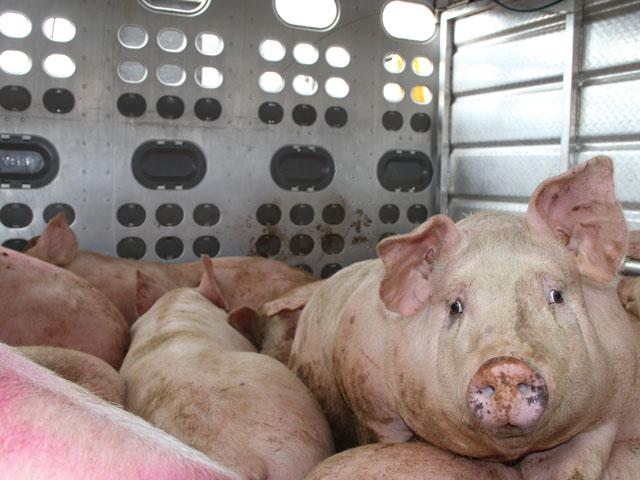Groups Call Out NPPC on Proposition 12
Animal Rights Groups Coalesce in Opposition to Federal Bill After Prop 12 Upheld
LINCOLN, Neb. (DTN) -- The Proposition 12 battlefield has moved from courts of law to the halls of Congress and public relations campaigns.
This week two animal rights groups -- the Center for a Humane Economy and Animal Wellness Action -- took shots at the National Pork Producers Council, and a new coalition formed against an anti-Prop 12 bill that could be included in an upcoming farm bill.
Proposition 12 -- a California law the restricts the sale of pork products only from farms that follow the state's requirements on how hogs are housed -- was upheld by the Supreme Court this spring. The state of Massachusetts is implementing a law similar to Prop 12 -- Question three -- after voters in that state approved the measure.
TARGETING NPPC PORTRAYAL
This week, the two animal rights groups issued an 18-page report targeting the National Pork Producers Council for its portrayal of how Prop 12 will affect farmers: "Pork Industry Exaggerations and False Framing About the Effects of Prop 12 and Question 3 Undercut Case for EATS Act."
EATS stands for the "Ending Agricultural Trade Suppression Act," introduced in both the U.S. Senate and the U.S. House of Representatives this summer. Lawmakers are considering including the act in the next farm bill, https://www.dtnpf.com/….
"The NPPC is misrepresenting the effects of Prop 12 on American pig producers, falsely claiming that California is telling some pig farmers in major producing states how to farm," the groups said in the report.
"The trade association would be wrong even if its claim had been correct that California alone represents 15% of U.S. pork sales. But that number, when considering total domestic and foreign U.S. pork sales and accounting for exempted pork products from the reach of the California and Massachusetts voter-approved statutes, is exaggerated by nearly 300%."
The NPPC, which managed to push Prop 12 to the Supreme Court, has been saying for years the California law will cost the pork industry billions of dollars to comply and potentially drive small farms out of business.
The groups' report said the potential effects of Prop 12 have been exaggerated.
"Nearly 40% of breeding sows are already in group housing systems, rather than gestation crates, and a market analysis shows that California and Massachusetts together will require just 6% of total U.S. pork production to come from facilities that allow the sows an opportunity to lie down, stand up and turn around," the groups said in a news release.
P[L1] D[0x0] M[300x250] OOP[F] ADUNIT[] T[]
"The report reveals that the industry has been in transition for more than two decades since Florida banned the use of gestation crates in 2002 and that it has existing capacity to supply gestation-crate free pork in two states."
FARMER CONCERNS GROWING
In a statement to DTN, the NPPC said federal legislation is needed to address growing concerns among farmers across the country.
"Once again, animal rights extremists are promoting mistruths that support their agenda," NPPC said.
"The facts are that California Proposition 12 is not science-based, will increase a farm's environmental footprint and creates conflict with our trading partners. As a result, this flawed law will increase prices and shrink supplies of an affordable and healthy protein for families inside and outside California, forcing consolidation within the livestock sector and the loss of family farms. That is why NPPC supports finding a legislative solution to Proposition 12 to prevent state and local governments from interfering with the production of agricultural products in other states and preserving consumer choice."
COALITION FORMS
Also this week, several animal rights and agriculture groups formed a coalition in opposition to the EATS act introduced in Congress in June.
Those groups include the American Society for the Prevention of Cruelty to Animals, Farm Action Fund, Health Care Without Harm and the Natural Resources Defense Council.
The EATS Act was first introduced in the Senate in June by Sens. Deb Fischer, R-Neb., and Roger Marshall, R-Kan. The bill is co-sponsored by Sens. Charles Grassley, R-Iowa; John Cornyn, R-Texas; Tom Cotton, R-Ark.; Kevin Cramer, R-N.D.; Joni Ernst R-Iowa; Eric Schmitt, R-Mo.; Ted Budd, R-N.C.; and Bill Hagerty, R-Tenn.
The legislation essentially would prevent states from impeding agriculture trade from other states.
The coalition announced a "Defeat EATS campaign" this week, saying in a news release the measure "aims to strip state and local governments" of their right to make policies focused on the production and manufacture of agricultural products within their own borders.
"This would put more than a thousand existing state and local laws on the chopping block, eliminating the ability of local governments to protect their communities' health and wellbeing," the group said.
Farm Action Fund President Joe Maxwell, a Missouri farmer, said in a statement the EATS Act would go beyond the issue of animal welfare.
"The EATS Act would accelerate market concentration in the food and agriculture industries to the benefit of a handful of multinational corporate agribusinesses," he said.
"This would be detrimental to rural economies, as the law would sacrifice critical opportunities for market differentiation that keep farmers afloat."
In addition, he said the bill would "strip away" state and local laws that protect health and the environment, "from laws targeting invasive pests, to wildlife protection, to baby food safety."
When the EATS Act was introduced, several national agriculture groups came out in support, including the National Cattlemen's Beef Association, NPPC, the American Farm Bureau Federation and the Agricultural Retailers Association.
Read the report here: https://centerforahumaneeconomy.org/….
Read more on DTN:
"CA's Ross: Prop 12 Not Emptying Shelves," https://www.dtnpf.com/…
"California Delays Prop 12 Enforcement Until End of 2023 Following Court Action," https://www.dtnpf.com/…
Todd Neeley can be reached at todd.neeley@dtn.com
Follow him on X, formerly known as Twitter, @DTNeeley
(c) Copyright 2023 DTN, LLC. All rights reserved.



